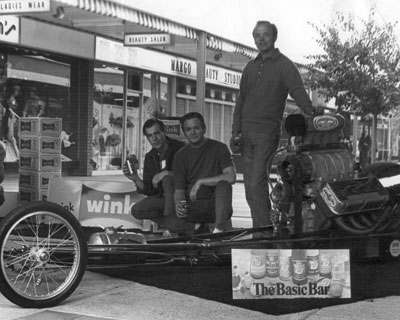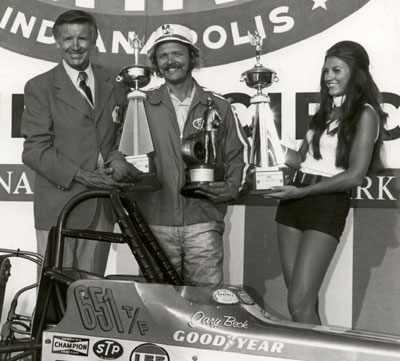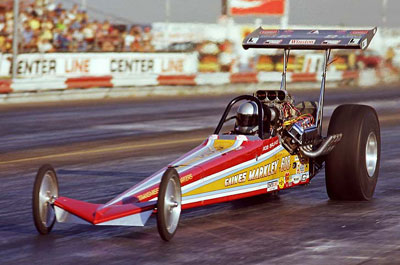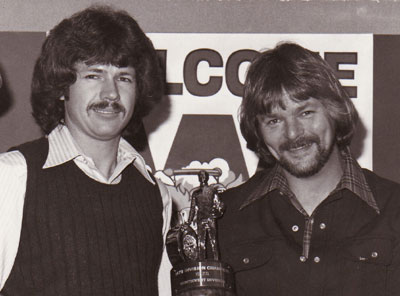The loss of Gaines ... and Beck's 'secret'
|
R. Gaines Markley -- just Gaines, to those who knew him -- had been sick for a while, and his death yesterday, while another sad addition to an already heart-wrenching season of losses, was not totally unexpected. His pending passing was kept from the news out of respect to him and his family, but it gave me time to find out more about the man before everyone said their final goodbyes, and two-time NHRA Top Fuel world champ Gary Beck was first in line. The two have been chums for 62 years, since grade school, and grew up together in north Seattle.
"We lived a block apart," he reminisced. "His parents and my parents were good friends, and our moms even golfed together. We've known each other since we were 5 and went to school together through high school and both joined the Emperors, a charter NHRA car club.
"We both had fast cars in high school, but joining the Emperors got us off the street because to be a standing member in a club you had to have a good driving record, and that got us into drag racing," he recalled.
The duo lived together after graduating from Lincoln High School in 1959 and began their racing careers with gas-burning altereds and dragsters in which they traded off in the cockpit each week, but success did not come easy for the two future world champions.
"It took us a long time before we won anything," he recalled humbly. "I don't think our first dragster beat anyone. After a few years, we finally figured it out. It was good times. We learned how to drag race and how to win and kept the car in our garage at our house."
They won a couple of NHRA Division 6 Super Eliminator championships, which earned them trips to the World Finals, and later took on a couple of partners to run the Markley, Beck, Rhodes & Sweeting entry.
In the late 1960s, Markley, who was a Ford mechanic by trade, began racing fuel cars, and Beck, who was in the construction business, moved into 200-mph front-engine Top Gas dragsters – with which he at one time held the NHRA national record -- and ultimately into rear-engine Top Fuelers with Ray Peets.
|
To  many, Beck seemed to come out of nowhere to win Indy in 1972, upsetting the field – including the "King of the Northwest," Jerry Ruth, in the final -- in just his second outing in a Top Fuel dragster and at his first national event. Although the lead paragraph of National DRAGSTER's story in the Sept. 15, 1972, issue was "Gary Beck won Top Fuel Eliminator at the Nationals. Gary who???" (so he, rather than Marvin Graham, who went from obscurity to Indy champ two years later, could well have ended up with that infamous nickname), as his extensive time behind the wheel shows, he was far from a rookie.
"As we coined it back then, 'I was a 15-year overnight success,' " he recalled with a laugh.
Beck won his first world championship in 1974 with Peets' Export A car and another nine years later in Larry Minor's vaunted machine. Both cars were the dominant performance machines in their era. The 2008 season marks the 25th anniversary of Beck's dominant season with the Minor car – capped with a championship and back-to-back stunning runs of 5.39 at the season's final two races – and we discussed briefly that great season, which will be the subject of a future column. Beck has been reliving the early 1980s watching some old Diamond P tapes. "It's amazing what was going on back then," he said, "and to listen to Steve Evans and Dave McClelland announcing them, it's really special."
But our story doesn't end there.
|
A couple of years ago, I wrote a well-received and still-discussed proclaiming that "Aussie Dave" Grubnic was not in fact Australian at all but had been born in Azusa, Calif., and taken on the Down Under personage and Crocodile Dundee accent to boost his marketing profile.
The story, of course, was not true, but I'm about to do a fair bit of rewriting of a piece of drag racing knowledge that many of you have had stuck in your trivia caps for more than three decades.
Beck is not – and has never been – Canadian.
Take a while to let that sink in. I know -- shocking, right? I know what you're thinking: What's next, Phil? The big tires belong on the front? Roland Leong's not really from Hawaii?Â
For as long as I've followed drag racing, Beck was the guy who rode out of Edmonton and onto the history pages with a stunning Top Fuel win at the 1972 U.S. Nationals. Partnered with car owner Peets, they were the scourge of Top Fuel in the early 1970s. Their Export A dragster – sponsored by a brand of Canadian cigarettes – was a terror everywhere it went. I remember when Frank Hawley, of London, Ont., won the 1982 Funny Car world championship, he was hailed as the second non-U.S. citizen to win an 91°µÍø Professional title. Well, guess what? He's now the first and still only.
Yes, race fans, Beck was born and raised in Seattle, a stunning revelation that came about innocently as I interviewed him about Markley. Beck moved to Canada in 1969 when he married his first wife, Penny, who was Canadian, and teamed with Peets, who was Canadian, but Beck is U.S. born and bred.
"My professional racing career started in Canada with a Canadian racing team, so I can see why people assumed I was Canadian, but I only lived in Edmonton for three years before we moved to California," he said. "But the part about me being a Canadian was all a hoax. I've had that label for many years and still do. I can keep telling people the truth, but it never ends."
Maybe now it does.
Today Beck, like many of eras past, is enjoying the nostalgia racing scene, working on a car owned by John Rodeck and driven by Beck's son, Randy. Bill Wolter, a crewmember from the Minor days, also works with the Becks, and fellow Hemet Mob henchman Terry Caldwell fields an alcohol-burning dragster.
"That's very competitive and a lot of fun," said Beck, who also attends Jr. drag racing events to cheer on his teenage niece, Cami, but don't look for him to crawl back behind the butterfly.
"I'm done with driving," he said. "Just to do it would be fun, but you'd want to do it well.
"I'm 67, and my eyes aren't as good," he added with a laugh, "and the first time they made us run at night, I wouldn't be able to see."

|
I also got some great comments on Markley from his former championship driver, Rob Bruins, a regular reader of this column.
"His given name is Ronald Gaines Markley, and on some of his earlier cars, he had R. Gaines on the car, and he loved to just play with people when they asked what the R stood for. He liked to tell them it was for 'romantic.'
"I had met Gaines in 1972 when I was crewing on Herm Petersen's first rear-engine car. He had tutored and guided me when I started driving an injected fuel car I bought in 1974. I teamed up with Gaines in June 1976 when I parted company with Jim Green after a six-month stint driving the Green Elephant Funny Car. Gaines had just had an accident at his machine shop that required some delicate surgery to his hand to repair a deep cut. Gaines asked me to do the maintenance on his car while he was mending. He couldn't really bend his hands for weeks and wasn't supposed to get it wet, let alone clean parts in solvent (or gas as was common). While Gaines was paying me to maintain his car during the week, I was asked by the Bubble Up team, [Jerry] Verheul and [Gordie] Bonin, to drive their dragster on the weekends to get it sorted out before they would have Gordie drive it; that way they could concentrate on their Funny Car.
"So that went on for a few weeks when according to Gaines, the Bubble Up guys approached him at a race and asked, 'Are you going to let the kid drive or can we have him full time?' No one ever asked me what I wanted to do. The Bubble Up guys decided not to go to the last PDA race that year at Orange County, so at Fremont I jumped tow rigs and went down to Orange County with Gaines. As we were headed for the staging lanes for the first qualifying pass, Gaines told me, 'Grab you your stuff; you're driving.' I drove from then on."
|
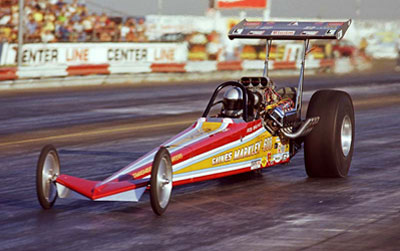 |
They won their first race together in Seattle in 1978 and the championship in 1979. Gaines was the best man at Bruins' wedding in 1980, but they weren't racing as often then, and Bruins was taking odd jobs to keep his income afloat. It all came to a sad end at the 1982 Winternationals, where they failed to qualify, and Bruins, still reeling from the stillborn deaths of his daughters, had had enough.
"I sat down with Gaines and Earl [Whiting, Markley's new partner] and told them I needed an income and if they couldn't provide anything, they needed to find a new driver. The next day there at the race, it looked like an unemployment office, the drivers at the trailer asking for that ride. It was none of Gaines' doing why I left, and he knew it.
"Gaines and I both thought so much alike it was at times scary," he recalled. "We are both tight with a dollar. In 1979, he sent me on the road to events, and he would fly in. He would always give me a stack of cash when I would leave the garage, and he had given me a credit card. We were a few months into the season, and I asked him how we were doing financially, and he told me things were fine, but he was a little worried about when the credit-card bill would show up. I asked why there should be any credit-card bill, I had been paying cash for everything; he gave me a big hug."
I went back and reread National DRAGSTER's coverage of Bruins' championship season, and it was fraught with hard times. As we know, they didn't win a single national event – the only team in history to win a Pro title without doing so – but owned the divisional series with six wins. Not that the path to glory was easily paved.
For example, Bruins and crewmember Butch Horn lost the alternator on the tow rig on Highway 90 in the Dakotas on the way to Columbus, Ohio, and drove two hours into Fargo, N.D., by firing up the trailer's generator and running an extension cord to a battery charger tucked under the hood. A few weeks later, the truck's engine gave up the ghost somewhere outside of Warm Springs, Mont. Bruins phoned Markley, who patched together an engine and borrowed a truck and a cherry picker and set out from Washington to rescue them; for the next 40 hours while they waited, Bruins and Horn took turns walking the half-mile to a nearby store whenever they got hungry. By the time Markley arrived, Bruins and Horn had the hood off and engine ready to come out, and they completed the entire engine swap at highway's side, with semi trucks roaring past, in just about five hours.
They battled fluke breakage and tough times but walked away champions at season's end and remained friends long after they stopped racing together.
"It was also Gaines who suggested to the Byron brothers that I might be available to drive their Competition eliminator dragster," he noted. "That union resulted in a division championship and several national records in 1993.
"I can tell you if I had lived closer to Gaines, [his wife] Annie would probably have had to kick me out of the garage at night so we would both get enough sleep to go to work the next day. He just knows so much about all things mechanical and is a great storyteller. Words can't tell you how I valued his friendship."





















































